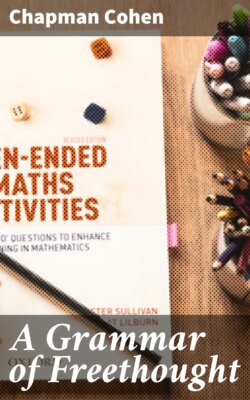A Grammar of Freethought

Реклама. ООО «ЛитРес», ИНН: 7719571260.
Оглавление
Chapman Cohen. A Grammar of Freethought
A Grammar of Freethought
Table of Contents
PREFACE
CHAPTER I. OUTGROWING THE GODS
CHAPTER II. LIFE AND MIND
CHAPTER III. WHAT IS FREETHOUGHT?
CHAPTER IV. REBELLION AND REFORM
CHAPTER V. THE STRUGGLE FOR THE CHILD
CHAPTER VI. THE NATURE OF RELIGION
CHAPTER VII. THE UTILITY OF RELIGION
CHAPTER VIII. FREETHOUGHT AND GOD
CHAPTER IX. FREETHOUGHT AND DEATH
CHAPTER X. THIS WORLD AND THE NEXT
CHAPTER XI. EVOLUTION
CHAPTER XII. DARWINISM AND DESIGN
CHAPTER XIII. ANCIENT AND MODERN
CHAPTER XIV. MORALITY WITHOUT GOD
CHAPTER XV. MORALITY WITHOUT GOD (Continued.)
CHAPTER XVI. CHRISTIANITY AND MORALITY
CHAPTER XVII. RELIGION AND PERSECUTION
CHAPTER XVIII. WHAT IS TO FOLLOW RELIGION?
ANNOUNCEMENTS
THE SECULAR SOCIETY, Limited
National Secular Society
Principles and Objects
PIONEER PRESS PUBLICATIONS
PIONEER LEAFLETS
FOOTNOTES:
Отрывок из книги
Chapman Cohen
Published by Good Press, 2019
.....
Biologically, what man inherits is capacity for acquisition. But what he shall acquire, the direction in which his native capacity shall express itself, is a matter over which biologic forces have no control. This is determined by society and social life. Given quite equal capacity in two individuals, the output will be very different if one is brought up in a remote Spanish village and the other in Paris or London. Whether a man shouts long live King George or long live the Kaiser is mainly a question of social surroundings, and but very little one of difference in native capacity. The child of parents living in the highest civilized society, if taken away while very young and brought up amid a people in a very primitive state of culture, would, on reaching maturity, differ but little from the people around him. He would think the thoughts that were common to the society in which he was living as he would speak their language and wear their dress. Had Shakespeare been born among savages he could never have written Hamlet. For the work of the genius, as for that of the average man, society must provide the materials in the shape of language, ideas, institutions, and the thousand and one other things that go to make up the life of a group, and which may be seen reflected in the life of the individual. Suppose, says Dr. McDougall:—
that throughout the period of half a century every child born to English parents was at once exchanged (by the power of a magician's wand) for an infant of the French, or other, European nation. Soon after the close of this period the English nation would be composed of individuals of French extraction, and the French of individuals of English extraction. It is, I think, clear that, in spite of this complete exchange of innate characters between the two nations, there would be but little immediate change of national characteristics. The French people would still speak French, and the English would speak English, with all the local diversities to which we are accustomed and without perceptible change of pronunciation. The religion of the French would still be predominantly Roman Catholic, and the English people would still present the same diversity of Protestant creeds. The course of political institutions would have suffered no profound change, the customs and habits of the two peoples would exhibit only such changes as might be attributed to the lapse of time, though an acute observer might notice an appreciable approximation of the two peoples towards one another in all these respects. The inhabitant of France would still be a Frenchman and the inhabitant of England an Englishman to all outward seeming, save that the physical appearance of the two peoples would be transposed. And we may go even further and assert that the same would hold good if a similar exchange of infants were effected between the English and any other less closely allied nation, say the Turks or the Japanese.[3]
.....